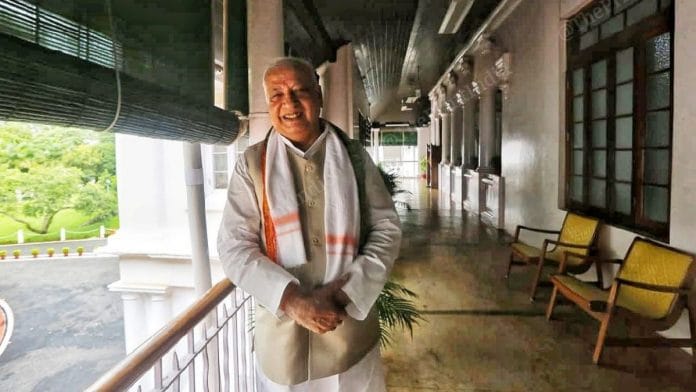Thiruvananthapuram: Kerala’s low Covid-19 mortality may have taken the fear of the disease out of people’s minds, causing them to come out in large numbers just as the state is witnessing a spurt in cases, feels Governor Arif Mohammed Khan.
In an exclusive conversation with ThePrint, Khan was also all praise for the CPI(M)-led Left Democratic Front (LDF) government in the state, especially Health Minister K.K. Shailaja.
“Impatience (of people with lockdown measures and other restrictions) is natural. But more than that the reason why numbers have gone up is because there is no fear left in the people of Covid,” Khan said. “It was there earlier in the pandemic but now because of the low mortality, that fear of death is not there. They know you may get the disease but you will get well too.”
Among the other reasons he lists for the spurt in cases are the large numbers or Keralites who are settled abroad and came back after the lockdown, and also the rural-urban continuum. “This is in effect one large city”, is how he described it.
On Saturday, Kerala reported a high of 11,755 more positive cases, taking its total to 2,79,855. On Tuesday, there were 8,764 new cases and 21 deaths, taking the toll to 1,080. The case fatality rate stands at 0.36 per cent against the national average of 1.53 per cent.
Also read: Kerala Covid surge not linked to ‘errors’, can’t stop spread — ‘rockstar’ minister Shailaja
‘Government has been overactive’
Khan has in the past been critical of the state government on many counts but is all praise of its handling of the Covid crisis. They also reaped the benefits, he said, of a very robust health system and people who are extremely aware.
“The numbers are as per the predictions. It was predicted that daily cases would touch 5,000 in September — they did,” he added. “So also in October when the daily cases of 10,000 were as per the predictions. That is why a crisis situation did not develop. We have a very proactive health minister, the chief minister is also very active. The government is working overtime.”
He also credits Kerala’s very strong culture of social work. “The numbers that registered for volunteer work in the first month itself, were very surprising. This is a society with a lot of empathy, may be because of their origins as a matrilineal society,” Khan said, outlining the history of over 100 years of the state to talk about the awareness levels, the literacy and the obsession with cleanliness that has held the state in good stead this pandemic season.
Also read: Arif Khan, Modi govt’s only 2nd Muslim governor, whose political views align with the BJP’s
‘Kudumbashree was a blessing’
Khan had special words of praise for the women collective, Kudumbashree.
“There is one special feature of Kerala which gives strength to the government in any situation, be it floods or be it a pandemic,” he said. “The government sends one message to them and they are out on the roads. That is Kudumbashree. This is a women’s organisation, an NGO that is sponsored by the government that has 43 lakh members and four lakh units.”
Khan added: “They (the Kudumbashree women) are not paid by the government. They are the reason why after the lockdown you didn’t hear any complaints from Kerala about migrant labourers who they call guest workers. Within less than 24 hours of the lockdown, 500 community kitchens were functioning and by the next day 1,000 were operational.”
Kudumbashree is a community organisation of neighborhood groups (NHGs) of women in Kerala. Originally conceived by a former civil servant, it is a programme for women’s empowerment at the grassroots level, particularly economic empowerment. Women through these NHGs work on a range of issues such as health, nutrition, agriculture among others, besides income generation activities and seeking micro credit.
“Kudumbashree is a very old organisation. They did a phenomenal job,” Khan added. “I have friends in Bengal, Bihar and Uttar Pradesh and I enquired with each one of them. There were no complaints from (migrant) workers from their states that were posted here.”
Also read: Laxity, low seroprevalence & reliance on antigen tests — how Kerala’s Covid battle came undone






